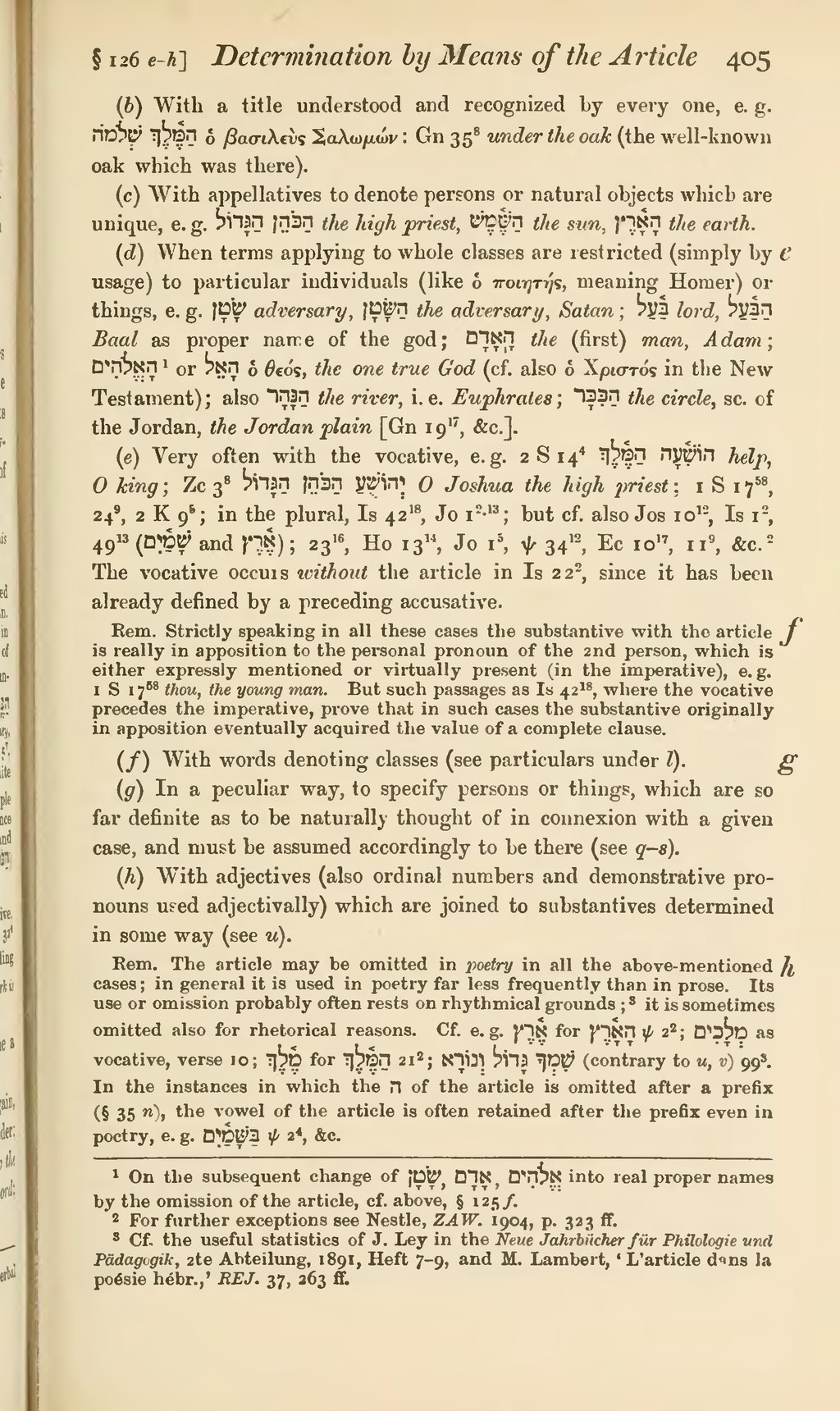(b) With a title understood and recognized by every one, e.g. הַמֶּ֫לֶךְ שְׁלֹמהֹ ὁ βασιλεὺς Σαλωμών: Gn 358 under the oak (the well-known oak which was there).
(c) With appellatives to denote persons or natural objects which are unique, e.g. הַכֹּהֵן הַגָּדוֹל the high priest, הַשֶּׁ֫מֶשׁ the sun, הָאָ֫רֶץ the earth.
[e] (d) When terms applying to whole classes are restricted (simply by usage) to particular individuals (like ὁ ποιητής, meaning Homer) or things, e.g. שָׂטָן adversary, הַשָּׂטָן the adversary, Satan; בַּ֫עַל lord, הַבַּ֫עַל Baal as proper name of the god; הָֽאָדָם the (first) man, Adam; הָאֱלֹהִים[1] or הָאֵל ὁ θεός, the one true God (cf. also ὁ Χριστός in the New Testament); also הַנָּהָר the river, i.e. Euphrates; הַכִּכָּר the circle, sc. of the Jordan, the Jordan plain [Gn 1917, &c.].
(e) Very often with the vocative, e.g. 2 S 144 הוֹשִׁ֫עָה הַמֶּ֫לֶךְ help, O king; Zc 38 יְהוֹשֻׁעַ הַכֹּהֵן הַגָּדוֹל O Joshua the high priest; 1 S 1758, 249, 2 K 95; in the plural, Is 4218, Jo 12, 13; but cf. also Jos 1012, Is 12, 4913 (שָׁמַ֫יִם and אֶ֫רֶץ); 23:16, Ho 1314, Jo 15, ψ 3412, Ec 1017, 119, &c.[2] The vocative occurs without the article in Is 222, since it has been already defined by a preceding accusative.
[f] Rem. Strictly speaking in all these cases the substantive with the article is really in apposition to the personal pronoun of the 2nd person, which is either expressly mentioned or virtually present (in the imperative), e.g. 1 S 1758 thou, the young man. But such passages as Is 4218, where the vocative precedes the imperative, prove that in such cases the substantive originally in apposition eventually acquired the value of a complete clause.
[g] (f) With words denoting classes (see particulars under l).
(g) In a peculiar way, to specify persons or things, which are so far definite as to be naturally thought of in connexion with a given case, and must be assumed accordingly to be there (see q–s).
(h) With adjectives (also ordinal numbers and demonstrative pronouns used adjectivally) which are joined to substantives determined in some way (see u).
[h] Rem. The article may be omitted in poetry in all the above-mentioned cases; in general it is used in poetry far less frequently than in prose. Its use or omission probably often rests on rhythmical grounds;[3] it is sometimes omitted also for rhetorical reasons. Cf. e.g. אֶ֫רֶץ for הָאָ֫רֶץ ψ 22; מְלָכִים as vocative, verse 10; מֶ֫לֶךְ for הַמֶּ֫לֶךְ 21:2; שִׁמְךָ גָּדוֹל וְנוֹרָא (contrary to u, v) 99:3. In the instances in which the ה of the article is omitted after a prefix (§ 35 n), the vowel of the article is often retained after the prefix even in poetry, e.g. בַּשָּׁמַ֫יִם ψ 24, &c.
- ↑ On the subsequent change of שָׂטָן, אָדָם, אֱלֹהִים into real proper names by the omission of the article, cf. above, § 125 f.
- ↑ For further exceptions see Nestle, ZAW. 1904, p. 323 ff.
- ↑ Cf. the useful statistics of J. Ley in the Neue Jahrbücher für Philologie und Pädagogik, 2te Abteilung, 1891, Heft 7–9, and M. Lambert, ‘ L’article dans la po&ésie hébr.,’ REJ. 37, 263 ff.
